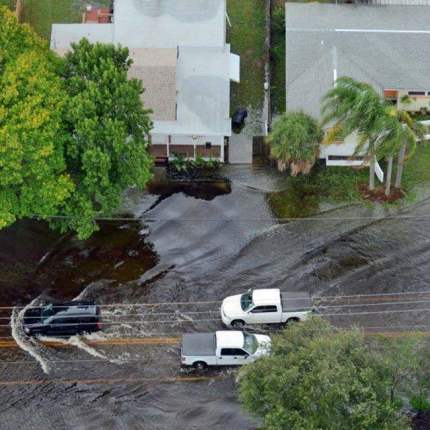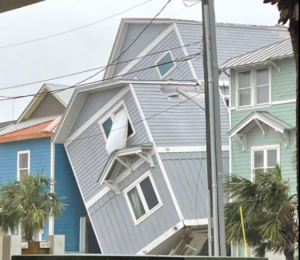 South Florida homeowners concerned about the rising cost of their flood insurance are being encouraged by the state to find out whether a policy written by a private company can save them money.
South Florida homeowners concerned about the rising cost of their flood insurance are being encouraged by the state to find out whether a policy written by a private company can save them money.
So far, shoppers will find only a few companies competing with the long-established National Flood Insurance Program, but state insurance officials and market experts expect that to gradually change as the cost of government-subsidized insurance increases in coming years.
Anyone who wants to understand the zigs and zags of the flood insurance market over the past couple of years should bring their knee-high wading boots out of the closet. It’s already deep, and the creek keeps rising.
After flood claims from a long series of disasters over the past decade pushed the federal flood program deeper into debt, Congress in 2012 enacted the Biggert-Waters Act. The reforms were intended to end taxpayer subsidies to the program by forcing property owners in the highest risk areas to pay premiums that more accurately reflected their flooding risks.
That debt ballooned to $24 billion after Superstorm Sandy hit the Northeast in October 2012.
But then property owners in high-risk zones started seeing massive increases in their flood insurance renewal bills, and Congress started feeling pressure to roll back the effects of the reforms.
As that debate was underway, two state legislators from Pinellas County spearheaded a law encouraging private companies to enter the flood insurance market by allowing greater flexibility on how they set rates and file them for state approval.
They reasoned that urging more private insurance companies into the game would help reduce taxpayer subsidies in the national program by driving some free market competition into the flood insurance pool. They also believed that private companies would be able to set prices that would enable them to make a profit and compete with the rapidly increasing costs of high-risk federal flood policies.
Two Florida companies were already rolling out private flood insurance options as the legislature acted.
The Flood Insurance Agency, based in Gainesville, started marketing to Gulf Coast homeowners whose renewal bills were increasing by thousands of dollars for the coming year.
“Our original intent was to compete for properties where [federal] subsidies were removed, who were suddenly getting bills for $12,000,” said Evan Hecht, the company’s CEO. The agency packages policies underwritten by Lloyds of London, a company not regulated in Florida to sell flood insurance but still highly rated throughout the world. Typically, Lloyds is used to insure the excess value of properties beyond the $250,000 maximum allowed by the National Flood Insurance Program.
A second company, Homeowners Choice Property & Casualty, based in Tampa, became the first Florida-based company approved by the state Office of Insurance Regulation to write private flood insurance as an endorsement. Homeowners Choice can offer up to $350,000 in flood coverage ($250,000 for the building and $100,000 for contents) at a lower price than the federal government to homeowners who also buy their multiperil property insurance from the company. The company is primarily interested in competing for policies that cost $2,000 or more under the federal program,
In late August, a Plantation-based company, Gridiron Insurance Underwriters, announced it was now selling private flood insurance for homes, apartments, condominiums and commercial buildings.
In an interview, company president David DeMott said Gridiron offers coverage underwritten by Lloyds, while also looking to partner with agencies selling federally backed policies covering up to $250,000 with the excess written by private carriers. The company is mainly interested in high-priced structures, DeMott said.
Executives at Homeowners Choice and The Flood Insurance Agency said interest in private flood insurance eased after Congress voted last spring to slow the pace of price increases for federally backed policies. Homeowners hurt the hardest by the premium increases saw their bills adjusted lower after the rollback and some received refunds.
Since the state law was enacted in June, no new company has filed with the state any plan to write new private flood policies under state regulations, said Amy Bogner, spokeswoman for the Office of Insurance Reform.
Still, the executives predict their products will become more attractive as prices for the federally backed policies increase, slowly but surely, in the future. The Flood Insurance Agency now offers flood policies in 33 states and expects to expand from about $500 million in insured property to $1 billion by the end of the year.
All three of the companies plan to continue targeting homeowners forced to pay high prices for flood insurance. They include homes in the highest-risk zones directly on the beach and older homes built in flood-prone low-lying areas. The companies are gambling that they can price those policies below the federal government’s rates and still make money.
They are not interested in competing for the $300 to $400 policies available to homes built well above sea level in zones deemed at low or moderate risk for flooding.
Sam Miller, vice president of the Florida Insurance Council, said his organization supported the state’s move to encourage private companies to write flood insurance. Companies will need time to figure out how to make it profitable, he said. “The more options homeowners have, the better,” he said.
Hecht of The Flood Insurance Company expects competition to grow slowly. “If flood insurance was easy, everyone would sell it and everyone would have a private policy,” he said.
Source: SunSentinel





